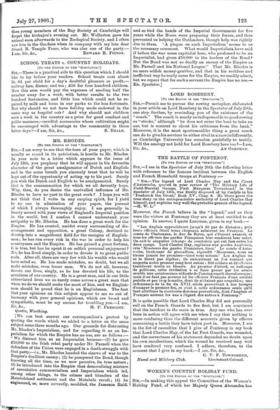THE BATTLE OF FONTENOY.
[To THE EDITOR OP THE "SPECTATOR.") SIR,-I see in the Spectator of July 20th the following letter with reference to the famous incident between the English and French Household troops at Fontenoy Sra,—The legend of Lord Charles Hay and the Count d'Anteroche, quoted in your review of ' The Military Life of Field-Marshal George, First Marquess Townshend; in the Spectator of July 13th, was finally disposed of by Carlyle in his Frederick the Great,' Book XV., Chap. 8. He there gives the true story on the unimpeachable authority of Lord Charles Hay himself, and explains very well the probable genesis of the legend. —H. W. L."
However, the French believe in the "legend," and as they were the victors at Fontenoy they are at least entitled to an opinion. In answer, I quote Larousse, given in my book :- " Les Anglais approchIrent ju.qu'l 50 pas de distance ; puis leurs officiers etant leurs chapeaux saluerent les Francais. Le eomte de Chabannes, le due de Biron, qui s'etaient avances, at tous les of eiers des gardes Francaises leur rendirent leer salut. On Bait le singulier echange de courtoisie qui ent lieu entre les deux camps. Lord Charles Hay, capitaine aux gardes Anglaises, eria Messieurs des gardes Franeaises, tirez.' Le comte d'Ante- roche, lieutenant de grenadiers, repondit ' Messieurs, nous ne tirons jamais les premiers—tirez vous meows.' Les Anglais ne se le front pas repeter ; ils executerent un feu routant qui emporia notre premier rang tout entier : 600 soldats et 52 officiers tombarent mods ou blesses. Au premier d'abord, ce raffinage de politesse, cette invitation k se faire passer par lea armee semble une quintessence ridicule de l'ancien esprit chevaleresque ; male ne faut pas accuser ici les officiers Francais d'une eivilite puerile et par trop honnete, dont ils n'etaient pas coupables ; une ordonnance de la fin du XVII. siècle prescrivait it nos troupes d'essayer le premier feu, et c'est a cette ordonnance seule quill fast attribuer la courtoisie devenue proverbiale, dont l'Anglais et Francais usarent les uns il l'egard des autres It Fontenoy."
It is quite possible that Lord Charles Hay did not personally call on the French Guards to fire first, but I am convinced that the incident in the main is true. Any one who has ever been in action will agree with me when I say that nothing is more confusing than the different accounts given by officers concerning a battle they have taken part in. Moreover, I see
in the list of casualties that I give of Fontenoy in my book that Lord Charles Hay, of the 1st Foot Guards, was wounded, and the correctness of his statement depended no doubt upon his own recollections, which the wound he received may well have rendered very confused. I adhere, therefore, to the account that I give in my book.—I am, Sir, &c.,
C. V. F. TOWNSREND,


































 Previous page
Previous page